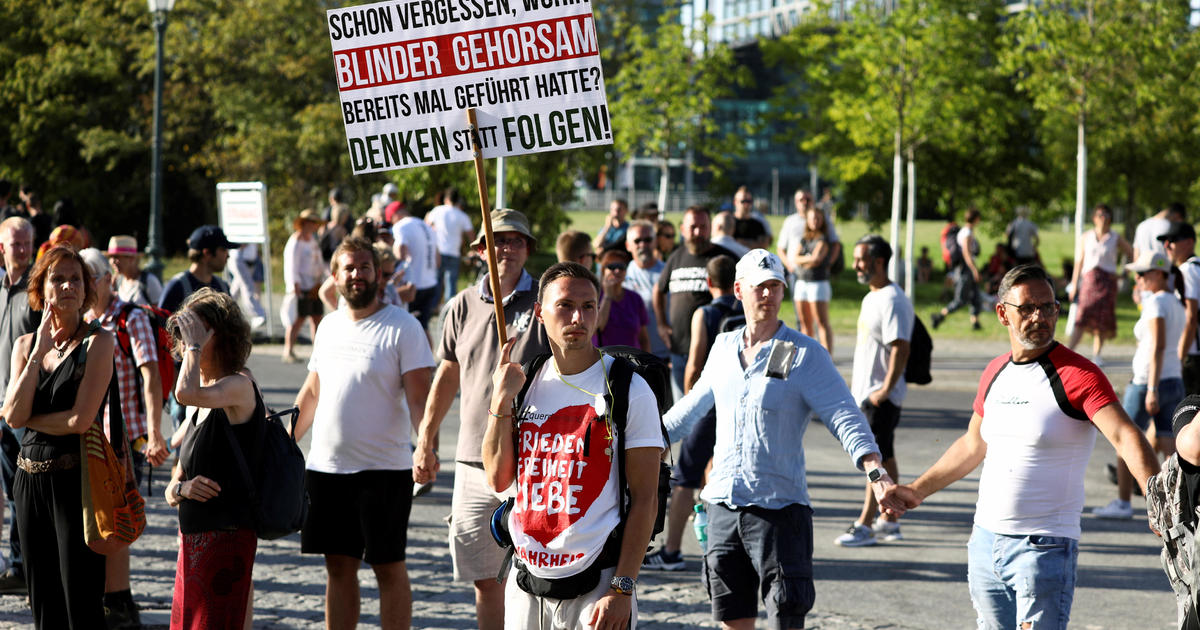
Roughly 20,000 people gathered without face masks or adherence to social distancing measures on August 1 in Berlin, Germany, to protest coronavirus restrictions. Now, Berlin officials are banning anti-restriction protests planned for this weekend, infuriating many of the country’s far-right supporters.
The Assembly Authority enacted the ban on Wednesday, saying “police would take consistent action if large crowds should nevertheless form.” Thousands of police are expected to be deployed this weekend to enforce the ban, according to Reuters.
The government justified the ban by claiming the participants are likely to violate public health guidelines.
More than 240,500 people in Germany have been diagnosed with the coronavirus since the pandemic began, according to Johns Hopkins, including more than 11,000 in Berlin. While the number of daily cases in the country steadily decreased between the end of April and the end of July, the number of daily cases has roughly doubled from August 1 to August 26, the data shows.
Berlin interior senator Andreas Geisel posted about the decision on Facebook, saying that “this is not a decision against freedom of assembly,” but a decision to protect against infection.
“We are still in the middle of the pandemic with increasing numbers of infection. There’s no denying that. We must therefore balance between the fundamental right of freedom of assembly and that of the integrity of life,” he said, according to a translation of his remarks. “We chose life.”
Geisel added that participants in the assembly that occurred at the beginning of August “deliberately broke the rules they had previously accepted in conversations with the police.” Those protections, he said, include wearing some sort of face mask and maintaining roughly 5 feet of social distancing.
“Such behavior is not acceptable. The state won’t be fooled around,” Geisel said. “…I’m not willing to accept a second time that Berlin is being abused as a stage for corona deniers, citizens of the Reich and right-wing extremists.”
Berlin has mandated that people remain approximately 5 feet apart and that people wear a face mask in public areas and indoor facilities. Public events with more than 1,000 people will not be allowed until September 1. Those who do not comply with these and other regulations may face fines.
Thousands were again intending to gather this Saturday to protest coronavirus restrictions. Protest organizer Michael Ballweg, founder of the group Querdenken 711, posted online that the ban has “confirmed” his belief that coronavirus guidelines are a way to “restrict basic rights.”
Jörg Meuthen, a member of the European Parliament and spokesperson for far-right political group Alternative for Germany (AfD), said on Facebook that the ban “is an attack on the fundamental rights of the people to freedom of expression and assembly.”
AfD is planning to hold a demonstration against the ban on Saturday outside the Brandenburg Gate.
“The foreground justification of this irresponsible and politically blind measure was that protesters should be expected to violate hygiene rules, which cannot be accepted,” Meuthen said, adding that Geisel’s comments on “corona deniers, citizens of the Reich an right-wing extremists” is “completely irrelevant.”
“It’s basically very simple: Democracy and freedom can only work if ALL citizens can express their convictions peacefully and freely, not only in the voting booth, but also in the form of demonstrations on the street,” he said. “There is currently, even though some people don’t want to hear this, exactly one political force of importance in our country that resolutely opposes this fatal development. This is us, the alternative for Germany.”
